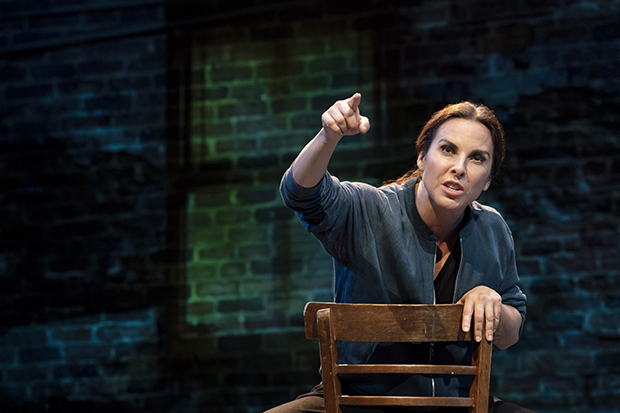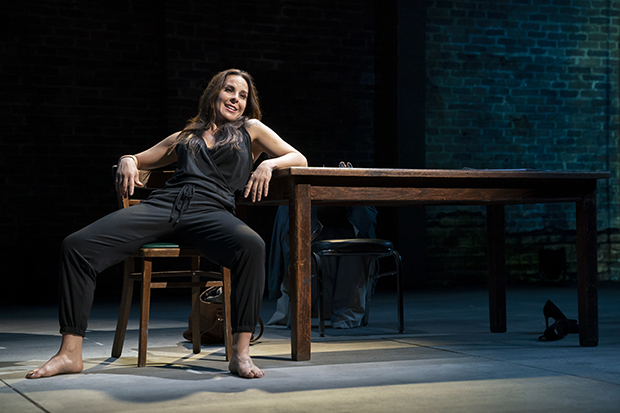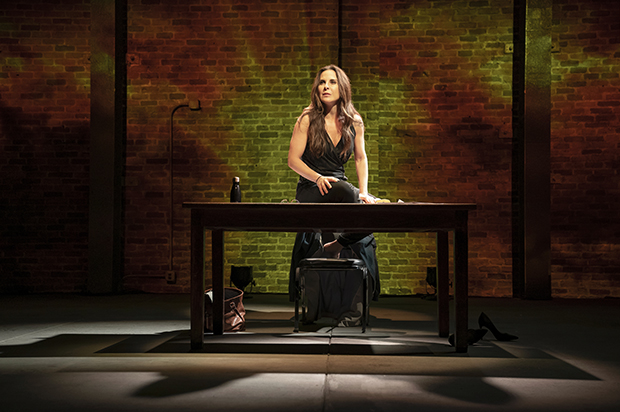The Way She Spoke Spotlights the Epidemic of Female Homicides in Ciudad Juárez
Kate del Castillo stars in the latest solo show from Audible.

(© Joan Marcus)
We'll probably never fully understand the hundreds (perhaps thousands) of murders perpetrated against women in Ciudad Juárez, Mexico. In a city that has suffered massively from gang and drug-related violence, reporters and activists remain convinced that something distinctly sinister sets the murders of women apart from those of men — and evidence of sexual violence in many cases supports that notion. These murders are the subject of Isaac Gomez's solo show The Way She Spoke, now receiving its New York debut from Audible at the Minetta Lane Theatre. For a major off-Broadway production, it often feels like a rough draft.
Pretentiously subtitled "a docu-mythologia," it tells the story of several women who have disappeared or been found murdered in Juárez. Many of them were workers at the maquiladoras, border factories born of NAFTA that sell to the United States duty-free while paying far below the US minimum wage. Activists who have militated for action from the Mexican government have also been killed, with family members suspecting the complicity of both narcos and police officers stewing in machismo.
Like The Laramie Project, The Way She Spoke conveys this information through a series of dramatized interviews. Actor Kate del Castillo deftly steps into every role, from a butch bus driver to a grieving mother to a convicted killer (Castillo's most unsettling performance). It ought to be so much more soul-shaking than it actually is.

(© Joan Marcus)
The experience of seeing The Way She Spoke is recognizing that it is very important, while still being unable to fully keep one's mind from wandering. It's a sensation akin to sitting through a boring church sermon. This may be due to the way Gomez holds his subject at arm's length through not one, but two insulating frames.
First, there's "The Actress," Castillo's baseline role. In the opening moments of the play, she arrives onstage with a wet umbrella and a basket of complaints about the industry before tucking into a script titled The Way She Spoke: A Docu-Mythologia. Ostensibly, she is there for a reading so the playwright can hear his words out loud and weigh their dramatic effect. If this is based on an actual event, it's a shame Gomez never really listened.
That brings us to our second frame: the playwright himself, who is the narrator of the play-within-the-play. He conducts the interviews and debriefs us through direct address. This way, the script always reverts back to how he is feeling, refocusing the drama on the playwright rather than the women.
Dramatically, it feels like a massive capitulation — a diary entry masquerading as drama. This is especially true near the end, when the script becomes a list of names of the dead, with brief, brutal descriptions of how they were killed. Roberto Bolaño took a similar tack in his novel 2666 (which also dealt with the Juárez killings) and I had a similar response: The problem with this avalanche of horrors is that the listener eventually becomes numb, unable to distinguish one victim from the next. It's like trying to track an individual snowflake in a blizzard.

(© Joan Marcus)
Illustrating this point, director Jo Bonney conjures realistic weather in the Minetta Lane in a production that feels expensive despite presenting as minimalist. Riccardo Hernandez's set features a table and mismatched chairs on a bare stage, the empty space the playwright has secured for this reading. Lap Chi Chu delineates the various layers of the script through lighting, bathing the stage in comforting sepia when the actor steps out of the script with a question. Aaron Rhyne projects images of Juárez on the upstage wall, while Elisheba Ittoop brings the sounds of the city into the theater.
We never hear (either through design or performance) the voices of the missing and killed women. Maddeningly, they remain statistics on the page rather than actual people — a persistent depersonalization that reminds us why so many of them have been killed without a massive response from either state or society.
Apparently, Gomez's play La Ruta (which I have not seen) takes a more intimate approach. A section of The Way She Spoke, about a mother named Yolanda and her missing daughter Brenda, overlaps with that one, and I got the sense that it could make its own compelling play. Unfortunately, The Way She Spoke is neither a sensitive family drama nor a hard-charging political indictment of the culture of impunity that has allowed murder to thrive in Ciudad Juárez. It's a docu-mess.







